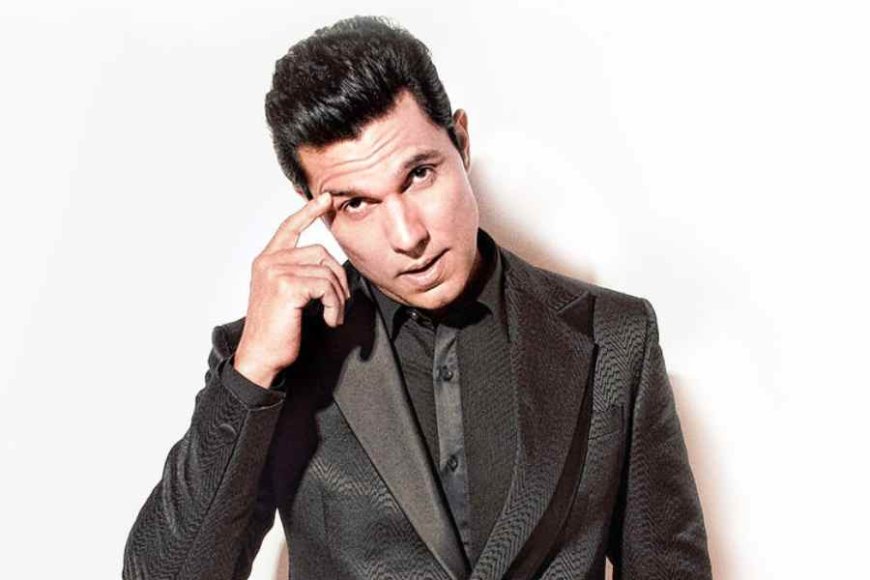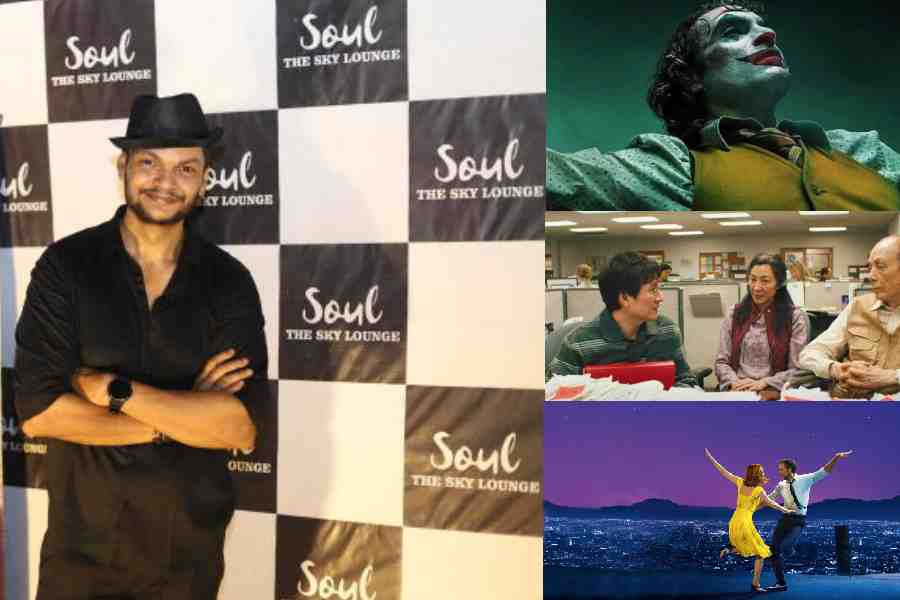Randeep Hooda Talks About Portraying Veer Savarkar and Making His Directorial Debut
Delving into the Controversial Historical Figure's Legacy and the Making of "Swatantra Veer Savarkar

In the upcoming film Swatantra Veer Savarkar, which opens in theaters on March 22, Randeep Hooda portrays Vinayak Damodar Savarkar, also known as Veer Savarkar. With this movie, the actor also makes his directing debut. T2 spoke with Randeep on his motivation for taking on the role of the contentious historical figure.
Why did you decide to take on the role of Veer Savarkar before directing the movie?
I told my friends and well-wishers that I was approached as an actor, and they all advised me against doing the movie. I was told, "You are a true artist; don't work on a movie that will associate you with a particular political party." They'll refer to you as a Sanghi.
Because I love history, I was aware of Savarkar. I began reading about the armed revolt he led for India's freedom from the British because I was curious to learn more. I came to understand that this portion of our history was created by individuals with a particular political slant in our textbooks, and the armed fight was only briefly mentioned in one or two paragraphs. "How is it possible that an armed struggle in India never succeeded?" I asked myself.
I read more about Veer Savarkar and became curious, wondering, "Why don't more people know about it?" Why does it not exist in our collective consciousness? Why is it absent from the textbooks used in schools? Why is this story not receiving more attention? That annoyed me.
I wanted to draw attention to this little-known, sometimes misinterpreted, and underappreciated information concerning specific periods of our history. It seemed unjust to me. My intention was to narrate the tale of Savarkar and his movement.
Savarkar was an ideologue and an influencer in addition to being a writer. All the armed revolutionaries who followed him were influenced by the book he authored on the Sepoy Mutiny of 1857. It raises the possibility that we could have deposed the British government far before 1947. Why were they attempting to eliminate an alternative viewpoint that emerged in the first decade of the 1800s and subsequently impacted individuals? Why was reading his book practically required in order to become a member of the Chandra Shekhar Azad-led Hindustan Socialist Republican Association, of which Bhagat Singh was a member? Why is Savarkar's book required reading for new recruits to the Indian National Army? Why is that portion not shown to us?
He was an advocate of intercaste marriage and a social reformer. He avoided being untouchable. However, none of these facets of his character have been shown to us. A portion of our history has been ignored, while other portions have had their contributions recognized and highlighted. Historians of our nation's post-independence political administrations carried out the task. Although I am not a historian, I used this historical period to create a film that tells the full tale of all the people who were engaged in this conflict.
via The Telegraph
You mentioned that Savarkar was vilified in addition to being an unsung hero.
Indeed. Political causes led to his demonization. He was first charged with Mahatma Gandhi's (Bapu) assassination. However, in the absence of proof, he could not be taken into custody. No relationship was formed. However, the story changed to claim that Bapu was slain by Hindus when he was accused of killing Bapu.
The Hindu Mahasabha, the Congress, and the Muslim League were the three main parties. By alleging Savarkar, the Congress split Hindu sentiment, denigrated the Hindu Mahasabha, and won the 1952 election without a challenge.
He was admired by many, but they were unable to back him since he was charged with killing Bapu. Despite being referred to as "a remarkable son of India" by Prime Minister Indira Gandhi, his legacy was marred. Later, when a particular party began to lose its hold on power in the 1990s, they began defaming Savarkar and attacking the new party that was emerging on the basis of Indianism. They dubbed him a British stooge. However, why did he spend 27 years of his life in captivity if he was working with them? The goal of some members of the political community's derogatory remarks and ignorant tirade against him is to misrepresent his accomplishments.
I'm passionate about this movie, and I want it to spark a movement to honor a man whose contributions were never recognized. Did non-violent measures alone bring us freedom? No.
Even Netaji (Subhas Chandra Bose), who opposed the religious split occurring, held Savarkar in the highest regard. Up to the very end, Savarkar talked for "Akhand Bharat," or undivided India, a concept also mentioned by Gandhiji and Netaji. However, the politicians establish the government, while the revolutionaries wage the war.
While filming this movie, what intriguing facts did you learn about Savarkar?
There were covert connections between all of the armed revolutionaries. They maintained covert groups. Even Savarkar established three covert organizations. He founded Abhinav Bharat, a covert organization with five members in each town. After traveling to England, Savarkar founded the Free India Society, a covert organization.
Sincerely, while researching Mr. Savarkar, I have grown to admire Mr. Gandhi even more. Gandhiji brought the nation together, yet both he and Savarkar were fallible.
In our fight for independence, many wheels have turned within wheels, thus it is unjust to take only a cursory view. Why isn't Mr. Savarkar regarded as a hero and a liberation fighter? Why is he perceived only as a figure of division? He created the term "Hindutva" to refer to a comprehensive political philosophy for human freedom. It stated that whomever believes that this region, which stretches from the Indus River to the Bay of Bengal, is their original home is one. He has consistently maintained that the nation must come before religion.
Savarkar desired that we have armed training and that Indians be made into officers so that we could lead armies. The first step was to equip as many people as possible, and the second was to determine when to twist the rifle barrel.
This is an example of propaganda filmmaking with an agenda, particularly during an election year.
As a producer, I have invested financial resources into this two-year-old film. It didn't work out that I wanted to release it on Republic Day this year and Independence Day last year. I shall refer to it as an anti-propaganda movie if someone calls it that as I am removing the propaganda made in Savarkar's honor. He never belonged to the RSS or the BJP. What then is the issue?
For the side claiming that Swatantra Veer Savarkar is a propaganda film, my film about Mr. Nehru would not have been propaganda if I had made it and released it on the same day. I would make a film about Mr. Nehru with the same sincerity and passion that I have put into this one.
I want people to see the movie for what it is. It is a really good movie. It moves really smoothly. This thriller spans 53 years, covering not only Savarkar's life but also events that surrounded him over that period. For the role, I had to shed thirty-two kilos. Nobody that I know of uses their own funds to produce propaganda movies.
Is this the most difficult project you have worked on thus far, since you were also the director?
I have never done something as difficult as this in my entire life. In addition to co-writing, I also directed, performed, and handled the logistics. I have learned everything there is to know about filmmaking from start to finish thanks to this.
Perhaps Mr. Savarkar wanted me to become more than simply an actor and instead become a filmmaker, producer, and writer since I was genuine with him and his spirit. It has been a blessing rather than a hardship. The challenges I faced throughout the filming of this film pale in comparison to Mr. Savarkar's battle with his legacy.
You've shed pounds for a number of previous movies, including Sarbjit. What else had to happen to you in order for you to become Savarkar?
I told the filmmaker that I didn't look at all like Savarkar when I was first offered the role. He was an average-built Maharashtrian, and I am a heavy-built Jat kid. So I realized I needed to reduce my weight.
It was a difficulty to absorb his attitude and perspective toward the world, his family, and individuals such as Mahatma Gandhi. I wanted to take on a lot of responsibilities and it was an extremely difficult task.
There have been rumors that you would run for office this year from your native Rohtak.
As a professional in politics, I have never taken any task lightly. As an actor and director, I have a lot more cinema in me. I will do it later, when I'm ready to give up on movies and take on tasks for the nation.
Except for the headline, this story has not been edited by Press Time staff and has been published from a syndicated feed.





















































